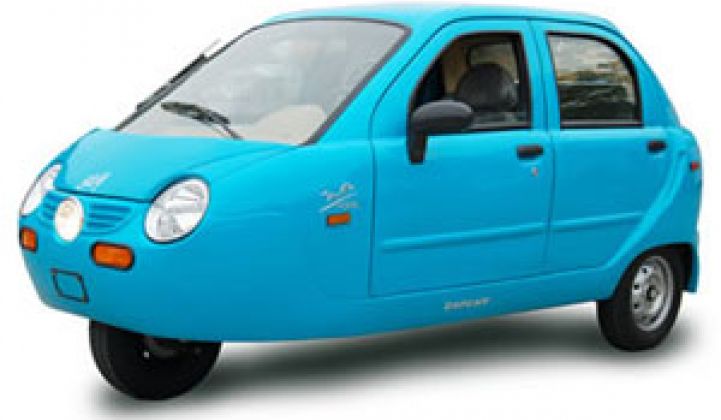Integrity Automotive, a new joint venture to produce Zap electric vehicles in the United States, is scheduled to break ground in Kentucky on its first manufacturing center on Thursday.
Formed by Zap and Integrity Manufacturing, an auto-parts supplier, Integrity Automotive plans to build the 1-million-square-foot manufacturing center in Simpson County.
The plant will assemble various Zap products, including scooters and the three-wheeled Xebra.
Zap, based in Santa Rosa, Calif., currently makes its Xebra cars and trucks in a Chinese plant owned by Shandong Jindalu Vehicle. Zap introduced the two Xebra models in 2006. The sedan costs about $11,000 while the truck is priced at $12,000.
The new plant is expected to begin rolling out vehicles in a year, said Randall Waldman, CEO of Integrity Automotive and Integrity Manufacturing, who added that the plant will have an initial production capacity of 300 vehicles per day.
On Monday, the state of Kentucky said it plans to provide Integrity Automotive with $48 million in tax incentives to help build the plant.
When it first applied for the state incentive, Integrity estimated that the project would cost $84 million. But now, after settling on a location, the company expects that construction will cost more than double that initial estimate. Waldman said the projected cost is now $175 million, and added that he hopes the project will be eligible for more state aid.
The state is set to consider an industrial revenue bond to help pay for the construction cost.
The tax incentives and bond likely won't be enough to cover the $175 million cost, however. Zap and Integrity will pay for the rest, depending on the bond amount approved by the state, Waldman said. He declined to disclose the stake each company holds in the joint venture.
The partnership with Integrity could prove a critical turning point for Zap, which has faced criticism about its ability to fulfill promises to build and deliver vehicles. A scathing story in Wired magazine in March outlined complaints by customers and former employees accusing Zap of touting plans to make models in order to boost its stock price, while those plans never materialized.
Alex Campbell, a Zap spokesman, said most of the allegations in the magazine "are untrue and wildly exaggerated."
"There are allegations about Zap not delivering on its promises, but Zap is delivering vehicles," Campbell said.
Campbell acknowledged that some of the projects previously touted by the company have been delayed. For example, a plan to make Zap-X, a high-end electric car priced at $60,000, is now on the "back burner." The company is focused on launching the $32,500 Alias model in 2009, according to Campbell and SEC filings.
The project to sell two flex-fuel models by Obvio in Brazil also hasn't happened. Zap, founded in 1994, signed the distribution agreement with Obvio in 2005, but Zap's most recently quarterly filings with the SEC said it's not certain about receiving shipment from Obvio because the Brazilian carmaker is new and might run into manufacturing problems delivering the cars.
Last September, Zap and Youngman Automotive Group in China announced a joint venture called Detroit Electric to make and market electric and hybrid cars, trucks and buses.
The two companies initially agreed to invest a total of $100 million in the joint venture, with Zap putting in $49 million and Youngman investing $51 million, according to Zap's SEC filings. Earlier this year, the two companies agreed to put in $2.5 million each and try to raise the rest. Fundraising efforts haven't been successful, noted the SEC filings.
Waldman said owning a manufacturing plant would give Zap greater control over production, something it hasn't had.
"At the end of the day, we can control manufacturing and meet the demand of our dealerships and produce quality products made in the United States," Waldman said.
Zap posted $1.92 million in second-quarter revenue, up from $1.41 million a year ago. The company reported a second-quarter net loss of $2.63 million, or 5 cents per share, compared with $3.31 million in net loss, or 7 cents per share, from a year ago.



